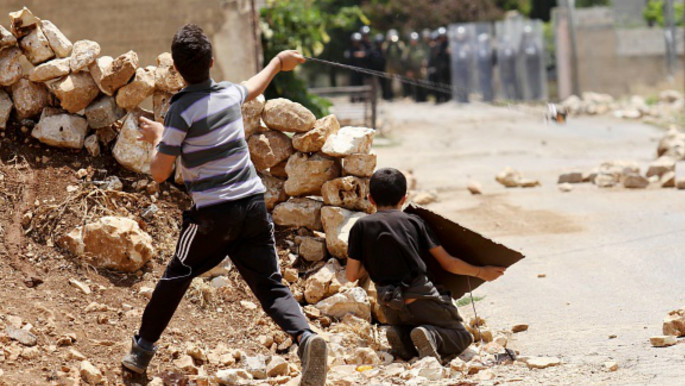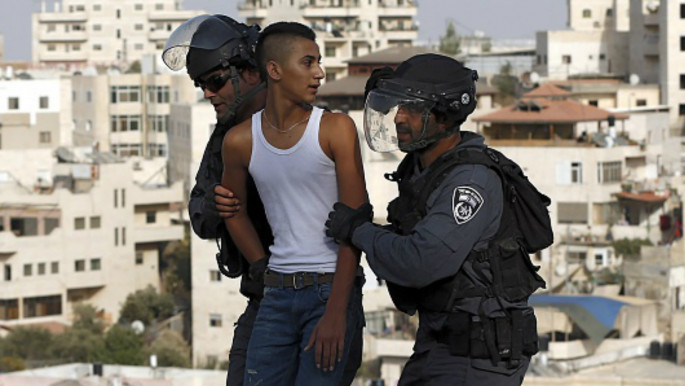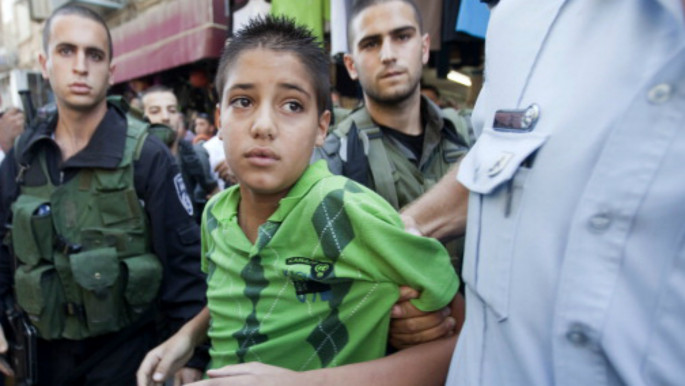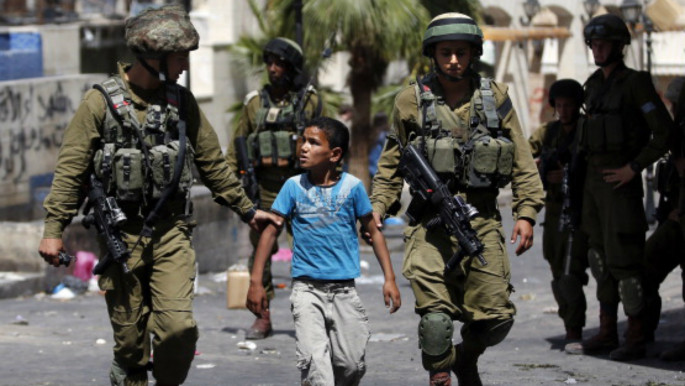'No way to treat a child': Palestine's imprisoned children
The Palestinian teenager did not see the imposing guard-towers and rows of razor-wire fences the prison van drove through, his eyes blindfolded and his arms shackled tight as he and his Israeli guards rumbled into the prison compound.
Taken for allegedly throwing stones at Israeli soldiers gathered near his home in the occupied West Bank, Ammar's arrest and subsequent incarceration made him one of the youngest Palestinian child prisoners to be held in Megiddo in the summer of 2014.
Having his blindfold removed and under the glare of prison lighting, Ammar was soon taken to his cell.
Older prisoners, also Palestinians arrested under a variety of allegations, quickly came together to act as guardians for Ammar as they had done for other Palestinian child prisoners past.
They would lay down rules to the 14-year-old essential to stave off the lurking and ever-present threat of physical and sexual assault inside the prison:
"Don't fight with others, don't talk after lights out, don't communicate with the Israeli guards, and don't share the details of your case."
 |
Ammar was but one of an ever-growing list of young Palestinian boys in their early teenage years forced into Israeli military prisons over 'throwing stones' |  |
Ammar was but one of an ever-growing list of young Palestinian boys in their early teenage years forced into Israeli military prisons over "throwing stones".
Like his unlucky peers, the signs of psychological and emotional stress were quickly apparent. He missed his mother and had trouble trying to sleep at night.
 |
| The most common offence charged by Israeli military prosecutors against Palestinian children in military courts is throwing stones [Anadolu] |
"You are constantly praying that your day to be released will come soon," Ammar said.
Six months passed inside Meggido before that day eventually came for Ammar.
Yet as he walked out into the open sunlight, Ammar left behind hundreds of other Palestinian boys, aged between 12 and 17, detained both in Meggido and in other Israeli military confinements.
A recently published report by Defense for Children International - Palestine [DCIP] has gathered dozens of testimonies about the presence and treatment of Palestinian children in Israeli prisons.
Their report, No Way to Treat a Child, reflects how detained Palestinian children face illegal and systematic ill-treatment, the denial of basic rights and physical abuse on a daily basis.
Released on Thursday, DCI's report focuses on the 8,000 or more Palestinian children arrested, prosecuted and imprisoned in the Israeli detention system since 2000.
"The Israeli military detention system seeks to administer control, not justice," DCI's US advocacy officer Beth Miller told The New Arab.
 |
Arresting children from their homes in the middle of the night, ill-treating them during arrest and interrogation, and prosecuting them in military courts that lack basic fair trial guarantees does not create a justice system |
 |
"Arresting children from their homes in the middle of the night, ill-treating them during arrest and interrogation, and prosecuting them in military courts that lack basic fair trial guarantees does not create a justice system," said Miller. "Rather, it stifles dissent and controls an occupied population through fear and violence."
|
"Each year, around 700 children [12-17 years], face arrest and prosecution in Israel's military and court system," the DCI report says.
"Children exposed to the Israeli military detention system suffer ill-treatment that is widespread, systematic and institutionalised throughout the process, from the moment of arrest until the child's prosecution and eventual conviction and sentencing," it adds, citing UNICEF's report on children in Israeli military detention.
Their findings note the remarkable duality inherent within the system.
When Israeli settlers in the occupied territories face arrest, their cases are processed through the civil court system, while Palestinian children are inevitably subject to military court and military law.
Illegal arrests
Heading to work at a local vegetable market, 17-year-old Anwar Shalakhti took a detour when he saw clashes between Palestinian protesters and Israeli soldiers up ahead.
Knocked to the ground by the fleeing crowd however, he himself was grabbed by Israeli troops.
"The soldiers kicked me and struck me with the stocks of their rifles," he told DCI. "One soldier stomped on my leg until it bled."
A significant number of children taken away by the Israeli military are arrested through illegal and often violent means, the report finds.
Night-arrests, with children arrested in their homes in the darkest hours by heavily armed soldiers while their families are often subjected to abuse, were the most commonly reported methods of detention.
 |
Night-arrests, with children arrested in their homes in the darkest hours by heavily armed soldiers while their families are often subjected to abuse, were the most commonly reported methods of detention |  |
By the time the children arrive at interrogation centres, they are not only sleep-deprived but often bear physical bruises from the arrest and the rough journey in the military vehicles.
Once inside the interrogation centre, the report finds, illegal treatment seems the established norm.
Forced confessions and violations in jail
Accused of throwing a stone at a car near an Israeli settlement in the West Bank, 14-year-old Waleed Lebdeh was taken to the nearby Ariel settlement by Israeli forces with his wrists bound.
 |
| A significant number of children taken away by the Israeli military are arrested through illegal and often violent means, says the report [AFP] |
"He interrogated me for about an hour" Waleed told DCI.
"He was shouting and pounding the table to intimidate me. I confessed to throwing one stone."
Waleed then signed a document written in Hebrew, the report adds. Despite the presence of a translator, the document was not translated to him. Two days later, Waleed confessed again in front of a military court.
The process of interrogation endured by Palestinian children is riddled with abuses and transgressions, the DCI report asserts.
In more than 97 percent of the 429 cases the DCI investigated, no lawyer or family member was present during the child's interrogation, as required by law.
In 88 percent of cases, the children were not informed of the reason for their arrest. More than 75 percent testified to being subjected to physical violence.
Verbal abuse and humiliation, including strip searching, were reported by more than three-quarters of the children surveyed. The majority also reported the denial of adequate food or water or access to the toilet.
But of all the reported violations, the use of solitary confinement seemed most galling to the investigators.
 |
But of all the reported violations, the use of solitary confinement seemed most galling to the investigators |  |
"Solitary confinement of children is unacceptable. In fact, the UN Special Rapporteur on Torture has called for an absolute ban on the use of solitary confinement on children," DCI's Beth Miller tells The New Arab.
"Israeli interrogators often use isolation to coerce confessions," Miller says. "No child should endure this kind of ill-treatment."
 |
|
Israeli forces arrest a Palestinian boy during clashes in the East Jerusalem neighbourhood of Issawiya on September 13, 2015 [AFP] |
"During the reporting period, we documented 66 cases of children held in solitary confinement for an average period of 13 days," she adds.
Miller relays the account of a 17-year-old Palestinian boy, Abdullah Radwan, whose testimony, she tells us, was "heart-breaking".
"Abdullah was arrested from his home at 3am. He was bound, blindfolded and transported to a military base in a nearby Jewish-only settlement," Miller says.
"During his interrogation, Abdullah was held in solitary confinement for 26 days."
The use of forced seclusion often produced the desired result.
"More than 90 percent of children held in solitary confinement provided a confession," the report finds.
"Israeli military court judges seldom exclude confessions obtained by coercion or torture, even those drafted in Hebrew, a language that most Palestinian children do not understand. In fact, military prosecutors rely, sometimes solely, on these confessions to obtain a conviction," it adds.
Once sentenced, jailed children are then subject to another phase of illegal treatment and violation and are often moved to locations which their families can visit only with utmost difficulty, if ever.
 |
Once sentenced, jailed children are then subject to another phase of illegal treatment and violation and are often moved to locations which their families can visit only with utmost difficulty, if ever |  |
Most Palestinian children arrested are accused of "throwing stones", an offence with a maximum prison sentence of 10 to 20 years, depending on the child's age.
 |
| A Palestinian boy is arrested by Israeli forces in Jerusalem during a demonstration in solidarity with Palestinian prisoners in Israeli jails on September 8, 2012 [AFP] |
In front of military judges, most plead guilty, knowing it is the quickest way out of a system that hardly ever grants bail.
Thereafter, almost 60 percent of Palestinian child detainees are transferred from the occupied territories to prisons inside Israel, the report states.
This itself is a violation of the Fourth Geneva Convention, it adds.
Restrictions on free movement imposed against Palestinians means families of detained children face major and often insurmountable obstacles trying to visit their loved ones.
The overwhelming trend towards detention violates the essential spirit of international law on the jailing of children, the report adds.
"International juvenile justice standards, which Israel has an obligation to implement after signing the UN Convention on the Rights of the Child in 1991, demand that children should only be deprived of their liberty as a measure of last resort," DCI reports.
Systems of control, not justice
 |
| Israeli forces detain a Palestinian boy following clashes in the centre of the West Bank city of Hebron, on June 20, 2014 [AFP] |
International pressure in recent years has sought to bring about some change in the treatment of Palestinian child detainees.
Yet according to DCI these have resulted in only superficial reforms.
"Over the past few years, growing international pressure has forced Israeli leaders to respond by making small changes to the military law as it applies to Palestinian children," Beth Miller tells The New Arab.
"We have found that these changes are largely cosmetic and fail to address the systematic and widespread ill-treatment that Palestinian child detainees face in the 24-48 hours following arrest," she adds.
The effects of the incarceration rarely stop once the children are released. Psychological trauma abounds, and access to any kind of mental health services are deficient.
"In many ways, Palestinian children who have endured detention in the Israeli military system have their childhoods taken away," Miller says.
 |
In many ways, Palestinian children who have endured detention in the Israeli military system have their childhoods taken away - DCI's US advocacy officer Beth Miller |
 |
"They have undergone such a traumatic experience - being taken from their homes in the middle of the night, coercive and often violent interrogation by soldiers in the absence of a parent or lawyer - that they come out adults.
"Children often withdraw from their community, staying indoors for many hours a day, and seldom leave their home or village," Miller adds.
"A long-term risk is untreated trauma symptoms. We have documented symptoms of psychological distress including bed-wetting, trouble sleeping, and self-restricting movement to avoid further interactions with Israeli forces," she says.
 |
Children often withdraw from their community, staying indoors for many hours a day, and seldom leave their home or village - DCI's US advocacy officer Beth Miller |
 |
The avoidance of any interaction with Israeli soldiers indicates one of the unwritten objectives of the entire detention system, which is concerned not with justice but with control.
"Often in the international community, there is a notion that Israeli military courts are 'broken' and can be improved or 'fixed'. This mistakenly presumes that the Israeli military detention and court system is interested in administering justice," the DCI report states.
"As Palestinian children continue to experience widespread ill-treatment and torture and the systematic denial of due process rights, it becomes evident that the Israeli military detention and court system is not interested in justice."
"Rather, the widespread and systematic ill-treatment of Palestinian children from the moment of arrest by Israeli forces illustrates how the system serves control interests of the occupation," it concludes.
"In actuality, the Israeli military detention and court system is working exactly as it is intended to, and failing to acknowledge this simply perpetuates injustice for Palestinian children."
Follow Sarah Khalil on Twitter: @skhalil1984





 Follow the Middle East's top stories in English at The New Arab on Google News
Follow the Middle East's top stories in English at The New Arab on Google News


